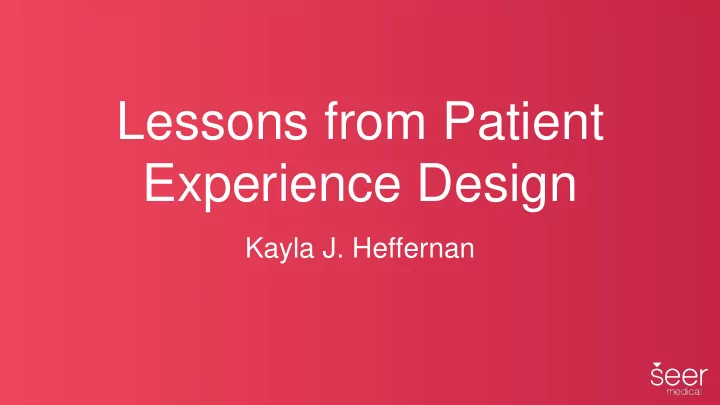

Lessons from Patient Experience Design Kayla J. Heffernan
Agenda 1. Crowdsourcing for clinical research 2. Vitamin D status with an app 3. Insertable device usage 4. Epilepsy diagnosis and management 5. Precision medicine as a patient 6. What does this mean for precision medicine? @kaylajheffernan
Crowdsourcing for clinical research
Crowdsourcing for Clinical Research
Opportunities and Benefits Birch, K. E., & Heffernan, K. J. (2014). Crowdsourcing for clinical research: an evaluation of maturity. In Proceedings of the 7th @kaylajheffernan Australasian Workshop on Health Informatics and Knowledge Management-Volume 153 (pp. 3-11). Australian Computer Society.
Prominent Example Birch, K. E., & Heffernan, K. J. (2014). Crowdsourcing for clinical research: an evaluation of maturity. In Proceedings of the 7th @kaylajheffernan Australasian Workshop on Health Informatics and Knowledge Management-Volume 153 (pp. 3-11). Australian Computer Society.
Prominent Example @kaylajheffernan
Crowdsourcing Future Opportunities Birch, K. E., & Heffernan, K. J. (2014). Crowdsourcing for clinical research: an evaluation of maturity. In Proceedings of the 7th @kaylajheffernan Australasian Workshop on Health Informatics and Knowledge Management-Volume 153 (pp. 3-11). Australian Computer Society.
Improving Vitamin D status with an app-based intervention
Personalised Recommendations Don’t smoke Get more vitamin D through sun exposure. But don’t get too much sun exposure because you might get skin cancer. And ‘too much’ depends on your skin type... how much skin you have exposed… clothing... if you’re wearing sunscreen... your location... the UV... the cloud cover... the pollution...
Based on individual & external factors
Behavioural intervention requires a trigger 1 Fogg, B. J. (2009, April). A behavior model for persuasive design. In Proceedings of the 4th international Conference on Persuasive Technology (p. 40). ACM.
Make the patient care
Insertable Device Usage
Insertable Device Usage @kaylajheffernan
Insertable Device Usage @kaylajheffernan
Epilepsy Diagnosis and Management
Epilepsy screening @kaylajheffernan
Tracking seizures @kaylajheffernan
UX is important in tracking seizures Event type upfront to reduce data entry errors Increased readability User feedback that duration Simplified duration selection selection is confusing Confusing navigation Small hit areas - Simplified navigation - Increased hit areas @kaylajheffernan
UX is important in tracking seizures Patient centric language - Small hit areas Increased hit areas - Clinician focused language - Small hit areas - Confusing navigation Simplified navigation @kaylajheffernan
Notifications for medication compliance For a behaviour to occur one must have the: - Motivation - Ability - Prompt Prompts remind them to take medication, however must be able to be snoozed so they are re-reminded when they have the ability to take them. @kaylajheffernan
Seizure Forecasting - Personalised mobile forecast - Integrate behaviour, environment, physiology - Unify measurements from wearable devices + mobile apps
Precision medicine as a patient
Individualized RCT Results @kaylajheffernan
Global patient experiences are confusing 🇧 🇩 🇻 🇪 🧃 Rx ❌ I.D @kaylajheffernan
What does this mean for precision medicine?
Precision Medicine 1. Patient experiences are key 2. People are already experimenting 3. Harness untapped patients data (ethically) 4. For interventions with digital component: a. Store static information rather than prompting for it b. Default to the inputs last used, rather than requiring re-entry c. Determine external information without user interventions d. Research usability before launch and monitor 5. Tailor recommendations per patient 6. People are going to do whatever they want to their bodies if they have deemed the rewards are better than the risk 7. People are becoming more comfortable with devices inside their bodies 8. People are complex 9. Think globally @kaylajheffernan
Questions?
Recommend
More recommend